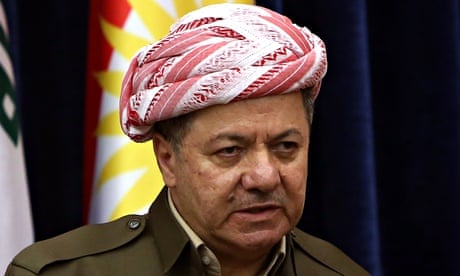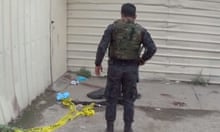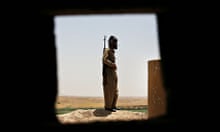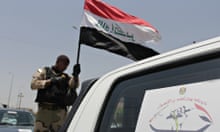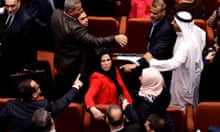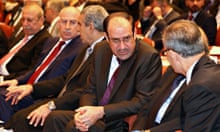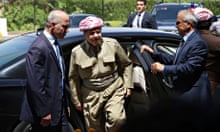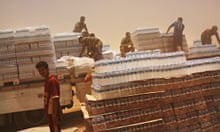Massoud Barzani, the president of the autonomous Kurdish region in northern Iraq, appears to have moved the country closer to partition after asking MPs to form a committee to organise an independence referendum.
An MP from the Kurdistan Democratic party (KDP) who was present at the closed session said Barzani did not offer a timetable, but it follows the Kurdistan president telling the BBC this week that a referendum was "a question of months" away.
"The president asked us to form an independent electoral commission to carry out a referendum in the Kurdistan region and determine the way forward," the MP, Farhad Sofi, said.
In his interview with the BBC, Barzani said the lightning advance of Sunni militants from the Islamic State of Iraq and the Levant (Isis) through the west of the country with the Shia prime minister, Nouri al-Maliki, left in control of Baghdad and the south, had reaffirmed the Kurdish goal of full independence.
"Iraq is effectively partitioned now; should we stay in this tragic situation that Iraq is living? Of course, we are all with our Arab and Sunni brothers together in this crisis, but that doesn't mean that we will abandon our goal," he said.
"I have said many times that independence is a natural right of the people of Kurdistan. All these developments reaffirm that."
The US has urged Barzani to stick with Baghdad, though the Kurdish leader said during a meeting last month with the US secretary of state, John Kerry, that it was "very difficult" to imagine Iraq staying together.
His call for preparations for a referendum came in the same week that Iraq's parliament was beset by walkouts when it met for the first time since elections in April. Sunni and Kurdish parties withdrew their MPs, ensuring the session collapsed, when Shia politicians refused to name their candidate to replace Maliki as prime minister before the Sunni and Kurdish MPs revealed their own nominations for speaker.
By convention in Iraq, the prime minister's position goes to the Shia, the speaker's position goes to the Sunnis, while the president goes to the Kurds.
The standoff underscored the deep divisions that run through the fragile state's political class, which has been unable to find unity even as the insurgency poses an imminent threat to Iraq's stability.
Across nearly all of northern Iraq, the national flag is no longer flying. The Kurds have raised their own banner above all former central government buildings in Kirkuk, which their forces took as the Iraqi army fled from Isis two weeks ago. In Iraq's west, and some of its centre, Isis has commandeered all government buildings and at least three cities.
Baghdad is caught in a pincer movement between the Kurds and Isis, which have no interest in the Iraqi state. The Kurds, who have long been cautious about their ambitions for sovereignty, are increasingly acting without restraint as central authority crumbles.
Isis, meanwhile, has been taunting the Shia-majority central government with claims it is imposing a caliphate across a vast tract of land from Aleppo in Syria to Diyala, north-east of Baghdad. The announcement has no practical significance, but shows the potent rise of the jihadist group, and the impotence of Iraq's government in dealing with it.
Also in contention is the area around Kirkuk, which is held by Kurdish forces. Officially under direct federal control, the area has long been regarded as disputed, but Barzani has said the dispute is finished, meaning Kurdish control of the area would continue.
Maliki dismissed that assertion. "No one has the right to exploit the events that took place to impose a fait accompli, as happened in some of the actions of the Kurdistan region. This is rejected," he said on Wednesday.
Elsewhere in the region, Saudi Arabia was on Thursday reported by state media to have deployed 30,000 soldiers to its border with Iraq after Iraqi soldiers withdrew, leaving the border unprotected. The state news agency SPA said King Abdullah had ordered all necessary measures to protect the kingdom against potential "terrorist threats".
The Saudi deployment came as Isis appeared to be extending its control over eastern Syria, from where it launched its assault on Iraq. The British-based Syrian Observatory for Human Rights said on Thursday that fighters from Isis's al-Qaida-linked rivals, the Nusra Front, had withdrawn from two towns in Deir al-Zor, leaving most of the border province under Isis control.
